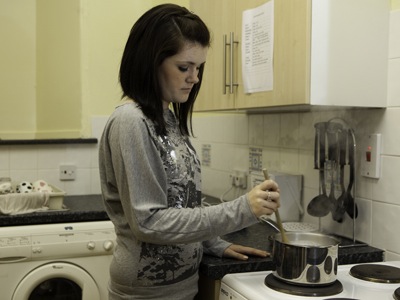
Based on the views of young people in care, Action for Children’s Keeping Myself Safe toolkit offers advice to social care workers on how to build good relationships with children in residential care and boost their emotional resilience.
Here Amy, who has lived at an Action for Children residential home for several years, reveals the approaches that helped her feel prepared for leaving care:
1. Good relationships take time
“If you’ve been there for a long time and you’ve got a good relationship with workers, they can pick up on when you’re down or when you’re happy,” says Amy.
“There’s been a few times when I’ve been really quiet and they’ve said ‘is there anything I can help with?
“When you have a good relationship with that person you obviously trust them more and having those girlie gossip times really helps. Speaking to them as a person. It’s just obvious that you get along.”
2. Appropriate boundaries and advice help us make the right decisions
“We have rules in the house but I know that it does help to keep us safe. I think it probably stops some folk getting into trouble.
“If you have to be in by a certain time it means you know where you’re supposed to be. Just knowing is quite good.
“If you’re ever unsure of a situation and you ask them for advice, quite a lot of them [practitioners] give you an honest opinion of what they think you should do. So again getting an adult’s opinion of what you should do will help me make the right decision. It’s someone to turn to.”
3. Challenge me appropriately and help me to learn from the mistakes
“Quite often we’re challenged by staff. But they won’t do it in front of all of the other kids, they’ll ask me one-to-one. They’ll pull us over and say: ‘Why did you do this? What happened?’
“It’s important they take us to one side. If I’ve done something wrong I wouldn’t like everyone to know about it. They don’t do that in front of everyone which is pretty good. They give you an opportunity to come to the side and get spoken to rather than everyone knowing your business.
“I’m glad about that because it gives me the opportunity to have a one-to-one with them. They should take note of whatever we did wrong but then tell us that there’s a different way of going about things. It is important that we make that mistake, then we can realise it’s a mistake too”.
4. Being ready to be independent
“I could have left here when I was 16 years-old but I liked staying here. But I’ve decided that now I’m ready for my own place. I’ve learnt lessons in this place that will really help when I live on my own.
“They’ve helped me cook. When I first moved in when I was 14 and I really couldn’t cook whatsoever. Now I can, and I do my own cleaning and my own washing.
“I’ve definitely learnt how to make better decisions. I do feel more confident and ready to live on my own and that is largely down to staff, they did really well. I’ll still visit here when I live on my own.”


 Family help: one local authority’s experience of the model
Family help: one local authority’s experience of the model  ‘I spent the first three months listening’: how supportive leadership can transform children’s services
‘I spent the first three months listening’: how supportive leadership can transform children’s services  How senior leaders in one authority maintain a culture of excellence
How senior leaders in one authority maintain a culture of excellence  How staff support ensures fantastic outcomes for children and families
How staff support ensures fantastic outcomes for children and families  Workforce Insights – showcasing a selection of the sector’s top recruiters
Workforce Insights – showcasing a selection of the sector’s top recruiters 

 Facebook
Facebook X
X LinkedIn
LinkedIn Instagram
Instagram
Comments are closed.